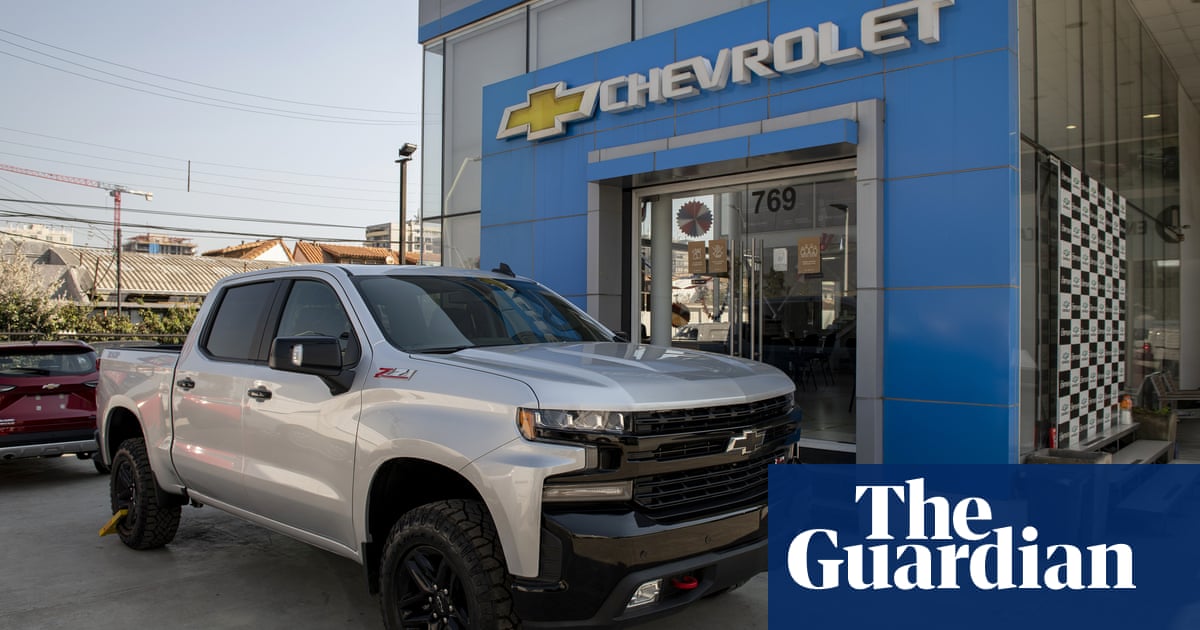
A loophole in Australia’s tax law is effectively subsidising the price of luxury utes such as Ram and Chevrolet SUVs, costing taxpayers more than $250m a year in foregone revenue, an analysis has found.
The research from the Australia Institute centres on the Luxury Car Tax (LCT) – introduced in 2000 for imported cars partly to protect the domestic industry that existed at the time – and an exemption that applies to certain utes.
The tax must be paid on the sale of all imported cars valued above a threshold, which is $80,576 this financial year. The 33% tax rate applies to the value of the car above the LCT threshold.
As all manufacturers have ceased car production in Australia, the LCT applies to any car that costs more than $80,576.
However, the LCT does not apply if a car is “a commercial vehicle designed mainly for carrying goods and not passengers”. This is defined as a car that can carry twice the weight in payload than it can carry in people – a requirement which almost every dual-cab ute on the market in 2024 can meet, according to the Australia Institute.
There is no requirement to demonstrate that the car is being purchased primarily for commercial rather than personal use such as for a family car.
The Australia Institute research found this exemption acts as a loophole and that the difference in tax treatment “incentivises people to buy utes” by making them cheaper when compared with sedans and smaller, more fuel efficient cars.
The analysis compared two cars: the 2024 Mercedes E350 EQ Hybrid, a rear-wheel drive sedan, costing $133,370; and the 2024 Chevrolet Silverado 1500 ZR2, a four-wheel drive crew cab pickup truck, costing $138,000.
Despite the hybrid Mercedes sedan costing almost $5,000 less, anyone buying it will incur an additional $15,841 in luxury car taxes, bringing its total cost to $11,211 more than the Chevrolet ute.
Electric vehicles are eligible for a higher fuel efficiency threshold of the LCT (of $91,387) for cars which require seven litres of petrol per 100km or better. However, the LCT exemption would still make the example Chevrolet – which has a fuel economy of 14.5l per 100km – cheaper overall than electric cars, whose sticker price is initially listed as less than the petrol-guzzling ute.
-
Sign up for Guardian Australia’s free morning and afternoon email newsletters for your daily news roundup
The analysis provided the example of a 2024 Mercedes-Benz EQE 300 electric car, which costs $133,575, compared with the Chevrolet’s price of $138,000. But after LCT is taken into account, the Chevrolet would be $8,231 cheaper due to the exemption.
The Australia Institute concluded the LCT exemption loophole for utes should be ended as it effectively acts as an incentive to buy vehicles that are worse for the environment. They also raised its cost to national tax revenues; the LCT was estimated to raise $1.3b in 2023-24, slightly more than the commonwealth spends each year on the ABC.
The Institute analysed tax and sales data and found that most of the cost of the exemption was related to the largest, most expensive utes, including those from US brands Ram and Chevrolet.
“The price of these vehicles magnifies the impact of their exemption from LCT,” the research found. It gave the example of a 2024 Ram 1500 TRX Final Edition (4×4), which is priced at $249,950 before on-road costs; this model avoided more than $50,000 in tax due to its exemption from LCT.
The analysis found that the LCT ute exemption led to more than $250m in foregone tax revenue in 2023, “almost three-quarters of which was due to sales of Ram and Chevrolet vehicles”.
after newsletter promotion
In calling for the removal of the exemption, the Australia Institute said it was unlikely to hurt tradespeople who actually need utes for work as non-luxury utes used by most tradies sit below the LCT threshold.
“This means that removal of the LCT ute exemption would not affect most ute drivers, while discouraging non-work related purchases of more expensive, damaging vehicles,” the research found.
Rod Campbell, a research director at the Australia Institute, said “the Australian public is subsidising big, dumb utes by hundreds of millions of dollars each year”.
Campbell said the revenue lost from the tax exemption was more than ten times the federal government spending on bike path construction under its active transport fund.
“Removing the luxury car tax exemption will not affect most ute drivers, particularly tradies,” he said. “Instead it targets those buying large luxury vehicles, worth sometimes hundreds of thousands of dollars, for personal use.”
“Economics 101 says that governments should tax things they want less of, and subsidise things they want more of, and it is stunning that the Australian government seems to want more big, dumb utes.”
Not a single sedan or hatchback ranked in the top 10 most bought cars in Australia in 2023, as the nation’s love affair with fuel-thirsty SUVs and utes reached new heights. The soaring popularity of SUVs has been estimated as leading to drivers needlessly spending an extra $13bn annually to fuel their larger cars.
Experts have previously pointed to manufacturers doubling their spend on advertising SUVs and utes over the past decade, and various other tax perks such as the instant asset write off scheme as factors that have been nudging Australians towards larger vehicles in recent years.
Source: theguardian.com


















